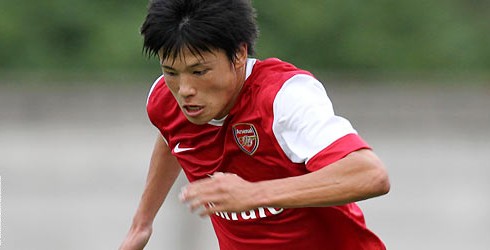
Ryo Miyaichi the Japanese wunderkid embarks on the South East Asia tour
After weeks of the never ending tragicomedy spectacle of the media getting pretzel shaped over Samir Nasri and Cesc Fabregas, Arsene Wenger finally broke radio silence vowing to fight as hard as possible to keep both players at the club.
The announcement came as one report had Nasri sold to City for £23m and the other Wenger agreeing to raise the French midfielder’s wages to £110,000 per week. Nasri is included in Arsenal’s maiden Asian tour while Fabregas has a ‘small muscular’ problem that will keep him out.
The Sun (through cell phone hacking) have learned that Fabregas has already told team mates that he’s leaving Arsenal this summer. Barca and Arsenal are haggling to the wire as conflicting report have Maxwell or Jean Abidal arriving at the Emirates while another has Barca deducting the costs of Jon Toral and Hector Bellerin to keep the transfer fee down. The Daily Mail has Barca’s bid of £31m being rejected with Arsenal demanding £4m more to secure his transfer.
Wenger meanwhile also went on to say that Gervinho is close to signing. Which should keep a few hearts from exploding. He’s also working long nights to bring those boatloads of transfers as promised. But here is the rub, the inflow is predicated on the number of players moving out. Which means that this transfer season will be rather long as clubs try and pay as little quid for Denilson, Squillaci, Bendtner, and Almunia.
The transfer market has been most active within the top tier standouts in the same league. This degree of insularity is by design. With belt tightening few can afford to risk spending on a high priced overseas transfer in the toughest league. The problem with Arsenal is that over the years their bench has been exposed for their underachieving ways while being paid exorbitant wages per week. They’re simply unattractive to league rivals. For Wenger it creates an unpleasant stasis of sorts.
He will have to look outwards to flog the likes of Denilson, Bendtner, Squillaci, and Almunia. But other than the Russian league which is flush with new money most clubs in the other European leagues are financially crocked. They might take on these players but at desperately cut rate prices as the transfer window winds down. It leaves Wenger with very little wiggle room. But one suspects he’s not really sweating bullets over this aspect.
Through all this hype, Wenger has been remarkably consistent in his theme of ‘tweaking’ the team. 95% he’s gotten right and 5% is all else that is needed for ‘success.’ Here he provides more evidence.
“I have said many times that we were very close to winning things last season, despite the disappointment we had at the end. I hope that provokes a response from my players. We were so close this time we want to come back and achieve it.”
He’s not looking to the outside. The solution lies within the existing group of players who’re expected to step up to the plate. Despite all those snafus on the pitch Wenger echoes a battered wife analogy of times are going to get better. The priority remains:
“My responsibility is first of all not to lose players and then to add and make us stronger.
He ends ominously in a sort of half whisper you hear while headed out the door:
“Let’s hope we can bring in one or two more additions of top quality.”
At times this well worn obduracy can be unwelcome. But one has to admire him for his refusal to buckle to the judgment by committee on how things need to be done. He’s reminding fans and critics that he’s still Arsenal’s manager. They’re not.